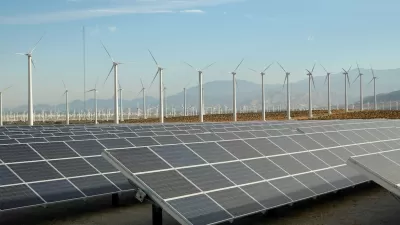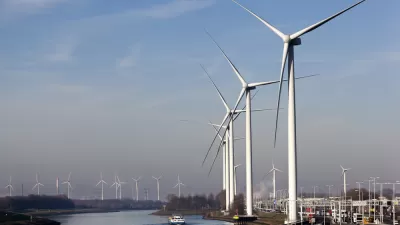Nations like Denmark are leading the world in producing renewable energy. But the transition to renewables doesn’t just amount to the number of solar panels or wind turbines that can be built, it takes a smart grid to maximize their potential.
Denmark utilizes wind power for 22% of its energy sources, a number that can jump to 70% on the windiest of days. Compare that to a dismal 4% of U.S. production, even after nearly $100 billion in investment. According to Michael O'Sullivan, NextEra Energy Resources' Senior Vice President, to facilitate the country's shift to more renewables, the U.S. needs a substantial shift in the way such energy is distributed in this nation, rather than in the way it's produced.
Part of the problem may be, as O'Sullivan states, that the U.S. has a "mature regulatory environment" compared to other nations, namely China, which has ramped up production of wind power facilities. In the U.S., the process of proposing, permitting, and approving a single wind turbine can take upwards of five years, combined with upfront consulting fees that can easily go to waste if the project is rejected.
But what O'Sullivan views as the most probable cause of the nation's lack of wind power production is the lack of a "smart grid." He sees the lack of federal leadership and coordination as the greatest obstacle to building such a grid. Wildly divergent policies and regulations at the state level means that dealing with each of the 48 lower states can be like dealing with "48 separate countries." Additionally, within those states are around 500 separate utilities each owning "some piece of the grid".
If regulations stay the same, we may end up like China, which wastes 25-30% of its wind power due to the fact that a significant portion of the massive 50-100 mega watts it installs each year simply aren't connected to the grid, says O'Sullivan. "It's wind to nowhere."
FULL STORY: Can the U.S. Become Like Denmark?

Alabama: Trump Terminates Settlements for Black Communities Harmed By Raw Sewage
Trump deemed the landmark civil rights agreement “illegal DEI and environmental justice policy.”

Study: Maui’s Plan to Convert Vacation Rentals to Long-Term Housing Could Cause Nearly $1 Billion Economic Loss
The plan would reduce visitor accommodation by 25% resulting in 1,900 jobs lost.

Planetizen Federal Action Tracker
A weekly monitor of how Trump’s orders and actions are impacting planners and planning in America.

Restoring Northern India’s Himalayan ‘Water Temples’
Thousands of centuries-old buildings protect the region’s natural springs and serve as community wells and gathering places.

Milwaukee to Double Bike Share Stations
Bublr Bikes, one of the nation’s most successful, will add 500 new e-bikes to its system.

DC Extends Application Window for Outdoor Dining Permits
District restaurants will have until the end of November to apply, but businesses with permits in rush hour parking lanes must end operations on July 31.
Urban Design for Planners 1: Software Tools
This six-course series explores essential urban design concepts using open source software and equips planners with the tools they need to participate fully in the urban design process.
Planning for Universal Design
Learn the tools for implementing Universal Design in planning regulations.
Caltrans
Smith Gee Studio
Institute for Housing and Urban Development Studies (IHS)
City of Grandview
Harvard GSD Executive Education
Toledo-Lucas County Plan Commissions
Salt Lake City
NYU Wagner Graduate School of Public Service





























